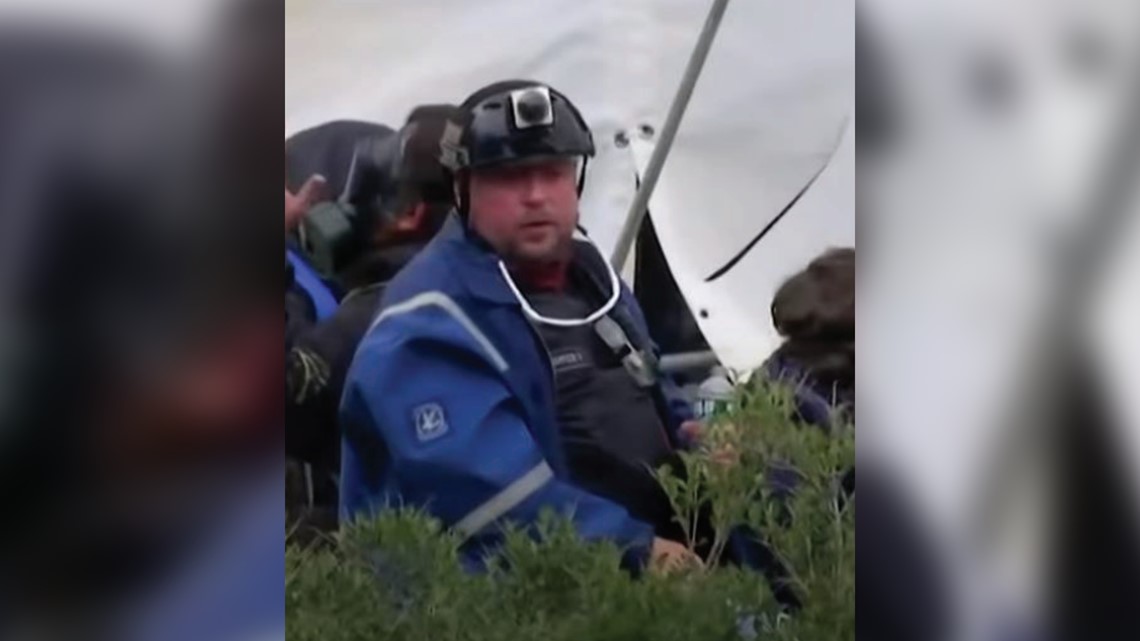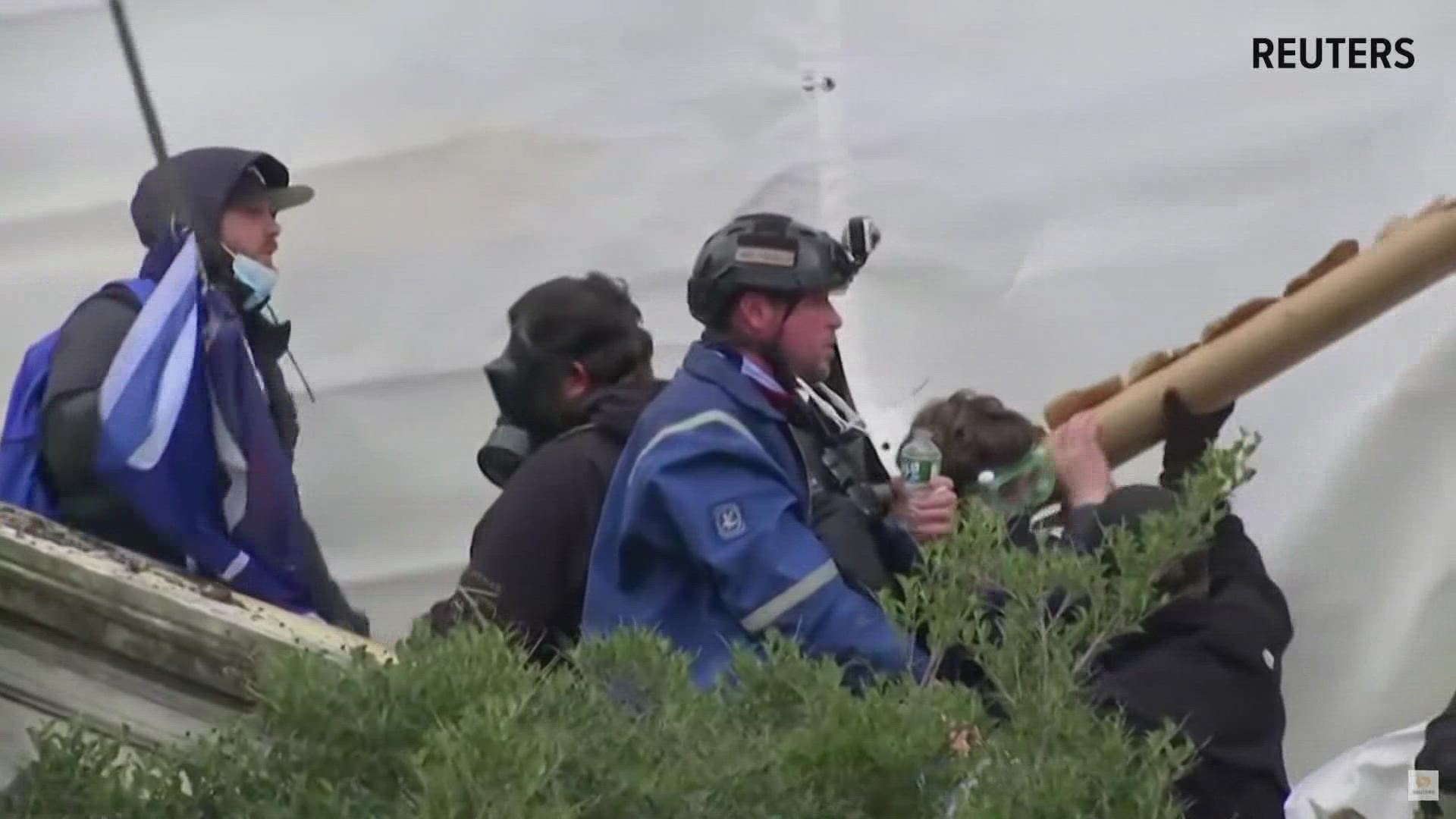WASHINGTON — A 49-year-old Texas militia member will appear before a jury in Washington, D.C., next week – the first of the more than 700 defendants charged in the Jan. 6 Capitol riot to go to trial.
Guy Reffitt, of Wylie, Texas, faces five felony charges for his alleged role in the effort to disrupt the certification of Electoral College votes for President Joe Biden. If convicted of the most serious charge against him – obstruction of an official proceeding – he faces a maximum sentence of 20 years in prison.
Here’s what to know as the Department of Justice begins its first prosecution in the unprecedented assault on the U.S. Capitol Building:
The Charges Against Him
Reffitt faces five felony charges in his case:
- Civil disorder - Transporting a firearm in furtherance of
- Obstruction of an official proceeding and aiding and abetting
- Entering and remaining in a restricted grounds with a firearm
- Civil disorder - Obstructing officers during
- Obstruction of justice – Hindering communication through physical force or threat of physical force
Prosecutors will tell jurors Reffitt is a member of the anti-government Three Percenters militia movement and that he spent the weeks leading up to the Capitol riot discussing his plans for Jan. 6, when then-President Donald Trump had urged followers to travel to D.C. for a “wild” protest to “Stop the Steal.”
Once at the Capitol, Reffitt is accused of entering the restricted area on the lower west terrace, where three U.S. Capitol Police officers say it took multiple rounds of pepper balls and O.C. spray to repel him from entering the building. Prosecutors say photos from the riot show he carried a semi-automatic handgun in a holster on his waist on Capitol grounds.


After returning home from D.C., Reffitt’s children say he threatened them if they cooperated with law enforcement, warning them “they would be traitors, and traitors get shot.”
Each count of civil disorder carries a maximum sentence of five years in prison. Carrying a firearm onto restricted grounds carries a maximum sentence of 10 years in prison. Each count of obstruction carries a maximum sentence of 20 years in prison.
The Lawyers
Reffitt will be tried before U.S. District Judge Dabney Friedrich. Friedrich was appointed to the D.C. District Court in 2017 by President Donald Trump. She served as associate counsel to President George W. Bush from 2003-2006, and on the U.S. Sentencing Commission from 2006-2017.
The government will be represented by veteran assistant U.S. attorneys Jeffrey Nestler and Risa Berkower. Reffitt is represented by William L. Welch III, a former Baltimore public defender with nearly 30 years of experience practicing law.
The Witnesses
In a witness list filed with the court, the Justice Department said it plans to call 13 people to testify against Reffitt. Those witnesses include:
- Three U.S. Capitol Police officers who physically repelled Reffitt from the building on Jan. 6;
- A special agent with the FBI who will testify about the Blackhawk Serpa CQC holster found at Reffitt’s home;
- The USCP inspector who was in charge of the department’s command center during the attack;
- A U.S. Secret Service supervisor to introduce video of Vice President Mike Pence being evacuated from the building – likely to be an important target of cross-examination for Welch, who has said Reffitt cannot have obstructed anything because he was never near the vice president;
- Two of Reffit’s children, Jackson and Peyton, who will testify about the threats their father allegedly made and why they believed he would carry through with them;
- A fellow militia member, “R.H.,” who traveled with Reffitt to D.C. and who has been granted immunity for his testimony.
It was not immediately clear whether Welch intended to call witnesses of his own. He had until Monday to file such a list with the court.
How Will the Jury Be Selected?
Eighty prospective jurors will be broken into two panels beginning on Monday morning for voir dire. Prospective jurors will face general and individual questioning from both the defense and prosecution, as well as Judge Friedrich. Among the questions they will be asked:
- Do you live or work at or near the U.S. Capitol?
- Do you have such strong feelings about handguns that it would make it difficult to be a fair juror in this case?
- Have you ever watched video of what happened at the U.S. Capitol on Jan. 6, 2021, on the news or the internet?
- Do you have any opinions about police, FBI agents or the “federal government” in general that would affect your ability to be a fair and impartial juror?
- Do you think that your political views, or those of your partner, will affect your service as a juror in this case?
- Do you use social media and what for?
Friedrich said Thursday during Reffitt’s final pretrial conference she would also ask jurors whether they were aware of Reffitt’s case specifically or have closely followed the cases of any other Jan. 6 defendants.
Prospective jurors may be stricken for cause if they appear to be unable to render a fair verdict. Each side will also be able to strike a limited number of jurors via peremptory challenge. Former U.S. attorney Neama Rahmani, now president of the California-based West Coast Trial Lawyers, explained what each side will be looking to achieve during jury selection.
“What the government wants here is to remove people who are on the extremes who believe in conspiracy theories or are anti-government,” he said. “Let’s not forget, the key witnesses in this case are going to be law enforcement witnesses. So you want jurors on this panel who respect law enforcement, who defer to their opinions, because they’re going to testify as to the primary charges in this case.”
On the defense side, Rahmani said Welch will likely be looking for skepticism.
“What you want, if you’re the defense here, is really one or two, maybe three, jurors who can hang this panel, because you’re not going to get an outright acquittal on a case like this,” he said. “You want strong personalities, people who are skeptical of government, people who may have had bad experience with law enforcement. Because otherwise, if you get jurors who are going to go with the flow, and you see those kids testifying, and you see FBI agents, and you see the staff of members of Congress up there, most jurors are going to be inclined to convict in this case.”
What Does the Prosecution Need to Prove?
The jury will receive instructions on each of the five counts against Reffitt regarding what factors prosecutors must show. For the entering and remaining charge, it’s as simple as proving he knowingly entered a restricted area with a firearm. For the civil disorder charges, prosecutors must show Reffitt traveled to D.C. with a firearm knowing it would be used unlawfully during civil disorder and that he impeded law enforcement and commerce while doing so. In this case, the government will achieve the commerce factor by showing sales at Safeway grocery stores in the District of Columbia decreased significantly during the riot.
The real test of the prosecution’s case will be proving the obstruction of an official proceeding charge. To do so, they will have to convince the jury of four elements beyond a reasonable doubt:
- Reffitt attempted or did obstruct or impede an official proceeding;
- Reffitt intended to obstruct or impede the official proceeding;
- Reffitt acted knowingly, with awareness that the natural and probable effect of his conduct would be to obstruct or impede the official proceeding;
- Reffitt acted corruptly.
Jurors will be instructed that to act “corruptly,” Reffitt must have used unlawful means or had an unlawful purpose, or both. He must also have acted with “consciousness of wrongdoing” – an understanding or awareness that what he was doing was wrong.
When Will There Be a Verdict?
Opening arguments and testimony from the first witnesses are expected to begin Tuesday afternoon. The trial could take a week or more, depending on jury deliberations. Once both sides complete their cases, jurors will be sequestered until they return with a unanimous verdict on each of the five counts Reffitt faces.
If Reffitt is convicted of one or more counts, the judge will set a separate sentencing date. Prosecutors and his attorney will then have the opportunity to introduce additional arguments, character statements and victim impact statements before Friedrich determines his sentence. Reffitt could and likely will appeal any conviction to the U.S. Court of Appeals for the District of Columbia.
How Can I Follow the Trial?
Unlike other Capitol riot hearings, there will be no phone line for the public to call in. Members of the media and public can watch the trial via a live stream at the federal courthouse in D.C. each day. For minute-by-minute coverage, follow WUSA9 reporters Jordan Fischer and Nathan Baca on Twitter and subscribe to our weekly "Capitol Breach" newsletter.

